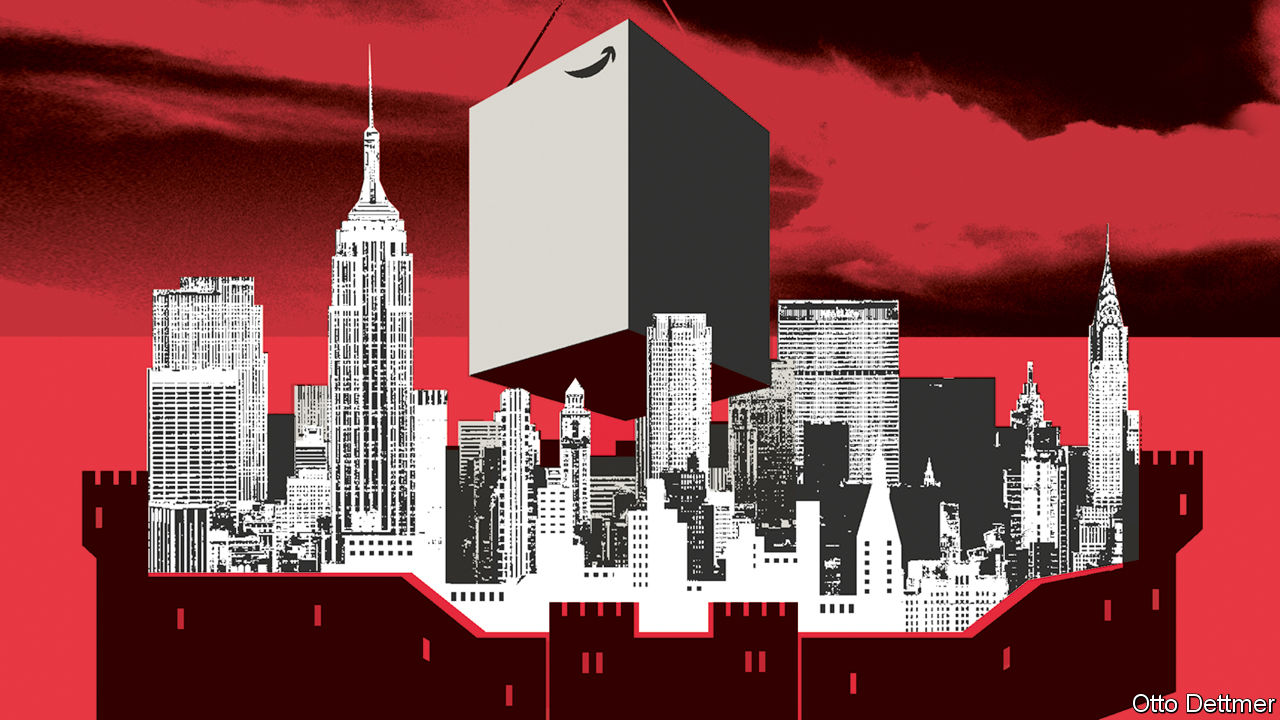
IN THE END, Amazon disappointed everyone. A year ago the e-commerce giant said it would open a second headquarters, and solicited bids from cities keen on the 50,000 new jobs and $5bn in investment it would bring. The gambit might have produced a fascinating experiment in urban development, and a departure from the concentration of top tech firms in a few favoured places. It did not. Though local governments wooed the firm with juicy incentives, no city nabbed the promised co-headquarters. On November 13th Amazon said it would split its new office between New York City and Arlington, a suburb of Washington, DC.
The decision to bring tens of thousands of high-paying jobs to two of America’s richest metropolitan areas is a notable example of a broader trend. Another came a few days earlier, when the Wall Street Journal reported that Google planned a dramatic increase in hiring in New York City. Politicians interested in boosting the fortunes of places other than superstar cities have their work cut out.
Once, poor places caught up with richer ones. From 1940 to 1980 the gap between wages in rich cities and in poor ones closed at a rate of about 1.4% per year, according to recent work by Elisa Giannone of the University of Chicago. Then convergence halted. Behind cities’ diverging fortunes is a change in the return to education. Wage convergence did not end for all workers after 1980, says Ms Giannone, but only for those with a college degree. That is because well-educated workers have done best in places where there are lots of them. The share of workers with a college education has risen most in cities where the population of graduates was already large. This clustering has helped push incomes in different locations apart. Regional inequality has been worsened by restrictive development rules in thriving places. The resulting competition for pricey living space favours people with higher incomes and filters those of modest means out of superstar cities.
Those cities are vehicles for transmitting knowledge. Edward Glaeser and Matthew Resseger of Harvard University argue that higher pay in skilled cities is not merely a matter of sorting educated and uneducated people into different locations; rather, cities facilitate learning and boost the productivity of entrepreneurs. When access to them is rationed by dear housing, some workers and employers lose out. The economy as a whole suffers. In recent work Chang-Tai Hsieh of the University of Chicago and Enrico Moretti of the University of California, Berkeley, estimate that looser zoning rules in elite cities could increase GDP growth by a third.
Other attractions probably drew Amazon and Google. The interests of tech giants are different from those of startups. Entrenched technological leaders have little reason to love places that encourage entrepreneurship and the transfer of knowledge. They can gain access to rivals’ innovations by buying them and would prefer their own proprietary technology to remain proprietary. It is possible that Amazon wants HQs 2 and 3 enmeshed in local tech ecosystems. But it is more likely to have had other benefits in mind.
Access to labour, for instance. Amazon cited the advantages of New York and Washington for its drive to attract “world-class talent”; each employs more knowledge workers than any other American metropolitan area. Large labour markets improve the quality of matches between workers with rare skills and the firms that need them, and cut the cost of economic disruptions (a sacked worker will more easily find a new job in a town with thousands of employers than one with just a handful). Amazon could probably attract applicants no matter where it is located. But some workers are hard to find outside superstar cities. Only there can households with two high-powered earners be certain that both will have access to a wide range of lucrative jobs. Siting its offices in such places may be the only sure way for Amazon to fish in an elite labour pool. Moreover, it is households with two high incomes that can best cope with expensive housing. For them, and the elite firms that want to employ them, other places are a poor substitute.
New York and Washington also offer proximity to important customers. Though Amazon and Google look like consumer-facing businesses, their growing range of cloud-computing services means they are increasingly participants in business-service supply chains. Close contact between different supply chains helped produce the growth of cities during the Industrial Revolution; the high cost of moving bulky goods pushed manufacturers to cluster. Building and maintaining products in the cloud for multinational firms (and for the American government) might similarly require tech firms to operate cheek-by-jowl with business partners.
That, too, is disconcerting. Productivity growth across the developed world has been disappointingly weak in recent decades. Dan Andrews, Chiara Criscuolo and Peter Gal of the OECD, a rich-country think-tank, put the blame on the slow diffusion of productivity-boosting techniques from top firms to the rest of the economy. As long as realising the benefits of new technologies requires close co-operation with leading tech firms, this is unlikely to change. The payoff to developing bespoke AI solutions for a major multinational with headquarters in New York might be big enough to attract an Amazon or Google to site an office there. When the customer is a local bank in Topeka, Kansas, it is not.
Prime donna
Small cities are at a disadvantage, then. But co-operation might level the playing-field. Cities could collectively agree to stop competing to lure firms with piles of taxpayer cash—which could be better spent on productivity-enhancing public goods such as infrastructure and education. Experimentation with promising but untested development strategies is badly needed, as a forthcoming paper from the Brookings Institution argues. Cities could work together to run pilots for such programmes and to share best practices. Then, if talented and ambitious workers grow weary of life in superstar cities, smaller ones might be ready to capitalise.








